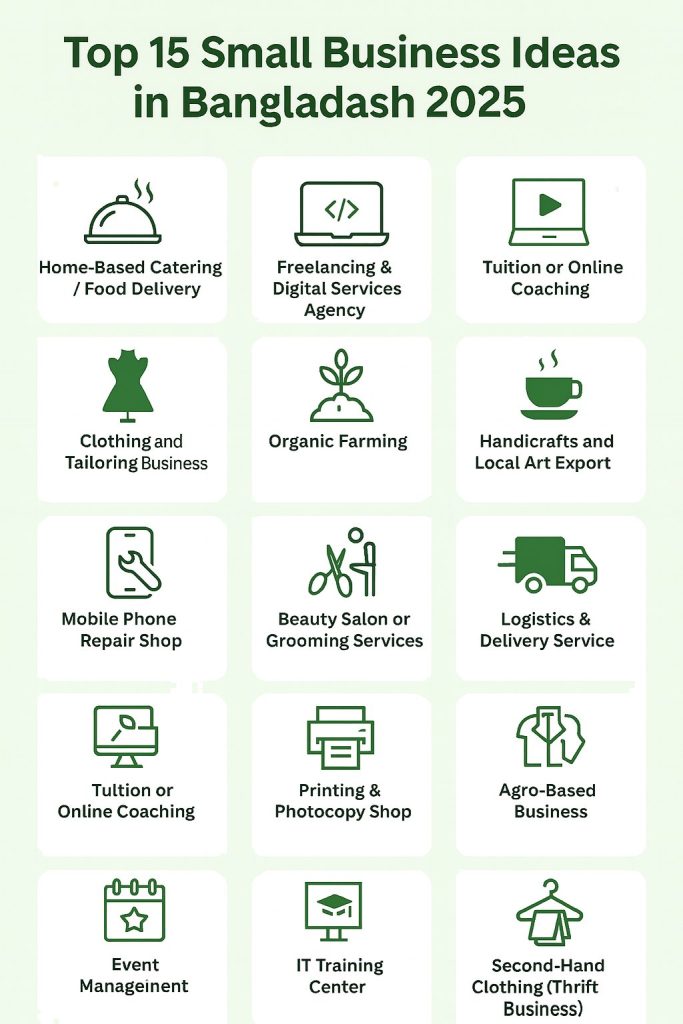Bangladesh has entered an exciting era of entrepreneurship. With rapid economic growth, expanding internet access, and a dynamic youth population, the country has become a fertile ground for innovative startups and top small-scale ventures. For decades, large industries like garments and manufacturing dominated headlines, but it’s the small businesses in Bangladesh that quietly power employment, local innovation, and economic resilience.
For students, job seekers, and aspiring entrepreneurs, this is truly a golden time. From low-investment business ideas like freelancing or food delivery to scalable ventures such as agro-businesses and IT training centers, opportunities are everywhere. Government initiatives, microfinance support, and digital transformation have lowered barriers, making it easier than ever to launch a venture with minimal resources. At the same time, knowing how to promote and grow these ventures is critical—choosing the right expertise matters, which is why many turn to marketing professionals for guidance in building sustainable growth.
As we step into 2025, small enterprises are no longer seen as “side hustles.” They are the backbone of Bangladesh’s growth, fueling self-employment, creativity, and sustainable development. If you’re looking for inspiration, here are the most practical and profitable business ideas in Bangladesh that can help you start your entrepreneurial journey today.
Why Small Businesses Thrive in Bangladesh
Bangladesh has quietly transformed into one of South Asia’s most promising destinations for small enterprises. With a steadily growing economy of Bangladesh, rapid digital adoption, and an ambitious youth population, the country offers fertile ground for entrepreneurs. Unlike large-scale industries, which demand heavy investments, small business ideas in Bangladesh often require modest capital but can generate steady cash flow. From online ventures to agro-based opportunities, the ecosystem supports both urban and rural entrepreneurship. Government initiatives, access to microfinance, and the growing role of technology combine to make small businesses not just possible, but profitable. Let’s break down the major reasons behind this momentum.

Economic Growth
Bangladesh’s economy has consistently delivered over 6% GDP growth in recent years, placing it among the fastest-growing in Asia. This economic expansion has created a growing middle class with rising disposable income. As consumer purchasing power increases, so does demand for diverse products and services from food delivery and fashion to digital education and grooming services. Unlike in earlier decades, when options were limited, today’s buyers seek variety and convenience, offering fertile ground for innovative small business models. For entrepreneurs, this means a widening customer base that is ready to spend on quality and unique offerings. Small enterprises can quickly adapt to these changing demands, filling gaps left by larger corporations and creating personalized experiences that resonate deeply with Bangladeshi consumers.
Digital Transformation
Technology has been a game changer for small businesses in Bangladesh. With over 125 million internet users and widespread smartphone adoption, the digital marketplace is thriving. Social media platforms like Facebook, Instagram, and TikTok have become virtual storefronts where entrepreneurs sell fashion, food, or even tutoring services with little upfront cost. Mobile banking services like bKash and Nagad make transactions seamless, even for those without traditional bank accounts. This digital transformation has lowered entry barriers, enabling micro-entrepreneurs to start and scale businesses quickly. From e-commerce shops to online freelancing agencies, entrepreneurs can now reach national and even international audiences from the comfort of their homes. The integration of digital marketing strategies and affordable PR tools ensures that even small enterprises can compete effectively. In 2025 and beyond, businesses that embrace this digital-first approach will remain agile, competitive, and profitable.
Youth Entrepreneurship
With more than half of the population under the age of 35, Bangladesh is powered by a dynamic, tech-savvy generation. These young people are eager to challenge traditional career paths and embrace entrepreneurship. Many are leveraging freelancing, digital agencies, and low-investment startup ideas as ways to build independent income streams. The rise of platforms like Fiverr and Upwork has shown young Bangladeshis that skills in writing, design, programming, and marketing can translate directly into global opportunities. Beyond freelancing, youth-driven businesses like cafés, thrift shops, and IT training centers are creating new markets in urban areas. What sets this generation apart is their adaptability and willingness to use technology to solve local problems creatively. Their drive for independence and innovation ensures that small enterprises will continue to thrive as vital engines of growth in Bangladesh.
Government Support
Government policies and programs have significantly boosted the environment for small enterprises. The SME Foundation actively provides training, funding, and mentorship for entrepreneurs. Special initiatives for women entrepreneurs, youth startups, and rural businesses are reducing entry barriers for underrepresented groups. Access to microfinance through organizations like Grameen Bank or BRAC has made it possible for thousands of small ventures to launch with minimal capital. Tax incentives and low-interest loan schemes also encourage formalization and scaling. These support systems are particularly vital for entrepreneurs in rural areas, where infrastructure challenges exist. With ongoing commitments to building a knowledge-based economy, the government recognizes small enterprises as a backbone of sustainable growth. This creates not just opportunities for individuals, but also a more resilient national economy that thrives on diversity and inclusivity.
Top 15 Small Business Ideas in Bangladesh for 2025 and Beyond
Bangladesh’s small business landscape has never been more vibrant. Fueled by rapid urbanization, digital adoption, and an ambitious young population, the country offers a wide variety of opportunities for entrepreneurs to explore. From traditional industries like tailoring and food services to modern digital-first ventures such as freelancing, online coaching, and IT training, the options are vast and adaptable. What makes these small business ideas in Bangladesh so appealing is their flexibility and many can be launched with minimal capital yet scaled for long-term profitability. Demand is also on the rise; urban middle-class families are willing to spend more on convenience, quality, and lifestyle services, while rural markets present untapped opportunities in agriculture and crafts.
By understanding local needs, leveraging digital platforms, and applying smart strategies, aspiring business owners can identify ventures that align with their skills and resources. Below, we’ll explore 20 of the most practical and profitable business ideas poised for success in 2025 and beyond.
1. Home-Based Catering / Food Delivery
Bangladeshis love food, and the rise of food delivery apps has made it easier for home chefs to start small. With modest investment in a kitchen setup, entrepreneurs can sell homemade meals, snacks, or traditional items like pithas. Demand is especially high in urban centers like Dhaka and Chittagong, where busy professionals prefer ordering in. Profit margins are healthy, and customer loyalty is strong when quality is consistent.
2. Freelancing & Digital Services Agency
Freelancing has become one of the top startup ideas in Bangladesh. Platforms like Upwork and Fiverr allow Bangladeshis to offer services in writing, design, marketing, and coding. Starting as a solo freelancer requires zero investment beyond internet access. As expertise grows, scaling into a digital agency offering SEO, content, or web development—can provide long-term stability. (See also Digital Marketing Opportunities & Trends for relevant insights.)
3. Clothing and Tailoring Business
Fashion is deeply rooted in Bangladesh’s culture. Small tailoring shops or boutique businesses cater to rising demand for customized clothing. With low startup costs for sewing machines and materials, entrepreneurs can target weddings, festivals, or modern fashion trends. Social media promotion is a low-cost way to attract customers, especially in urban areas.
You may read: Top 20 Clothing brands in Bangladesh Market
4. Organic Farming
Health-conscious consumers are increasingly turning to organic produce. Small-scale organic farming—vegetables, fruits, or poultry—has strong potential in Bangladesh’s growing cities. While initial investment in land and resources is higher, profit margins are strong due to premium pricing. Partnerships with grocery stores or online marketplaces ensure consistent demand.
5. Handicrafts and Local Art Export
Bangladesh is rich in traditional crafts like nakshi kantha, pottery, and bamboo products. With global e-commerce platforms, these products can reach international buyers. Small entrepreneurs can collaborate with rural artisans and act as distributors. Exporting handicrafts adds value and preserves cultural heritage while generating income.
6. Mobile Phone Repair Shop
With over 100 million mobile phone users, repair services are in constant demand. A small repair shop requires moderate investment in tools and training. Location is crucial—setting up in busy neighborhoods or near universities guarantees steady business. Profitability grows with specialization in smartphones and accessories.
7. Beauty Salon or Grooming Services
Bangladesh’s growing middle class, especially urban women, invests heavily in beauty and grooming. Starting a small salon at home or renting a small space can attract steady clients. Services like bridal makeup, hair styling, and skincare are highly profitable. Men’s grooming salons are also trending in urban markets.
8. Small Café or Tea Stall
Tea is central to Bangladeshi culture. A creative tea stall or café with unique flavors and ambiance can attract students and young professionals. Startup costs vary from modest roadside setups to trendy cafés. Margins are good, and word-of-mouth marketing can quickly build popularity.
9. Tuition or Online Coaching
Education is a priority in Bangladesh, and parents constantly seek tutors for children. Starting with home-based tuition requires no investment. Online coaching through Zoom or Facebook Live expands reach beyond locality. Specialized coaching for exams (SSC, HSC) or skills (English, IT) is highly profitable.
10. Logistics & Delivery Service
As ecommerce grows, logistics is booming. Starting a small delivery service requires investment in bikes or vans. Partnerships with online shops ensure regular demand. Urban centers are ideal, but smaller towns are emerging as new markets.
11. Printing & Photocopy Shop
Near universities, offices, and government centers, printing and photocopy services are essential. With basic equipment, entrepreneurs can provide printing, binding, and graphic design services. Adding digital printing or banner design can increase profitability.
12. Event Management
Bangladeshis celebrate weddings, birthdays, and corporate events with grandeur. Even small-scale event planning businesses can thrive by managing decoration, catering, and logistics. Partnerships with vendors keep costs low while ensuring customer satisfaction.
13. Agro-Based Businesses
Agro-processing such as rice milling, dairy, or spice grinding—has strong demand in rural and urban markets. Small businesses can scale with access to government loans and microfinance. Agro-entrepreneurship supports both profitability and food security.
14. T Training Center
As Bangladesh positions itself as an IT outsourcing hub, IT training centers are in high demand. Teaching coding, digital marketing, or freelancing skills requires investment in computers and trainers. Partnerships with local universities or NGOs expand reach.
15. Second-Hand Clothing (Thrift Business)
“Foreign clothes” or thrift items are very popular in Bangladesh’s urban areas. Starting a second-hand clothing store requires low investment in sourcing. Social media thrift shops have also become trendy among youth, offering high margins with minimal overhead.

Challenges for Small Businesses in Bangladesh
Starting a business in Bangladesh isn’t without obstacles:
- Funding Limitations: Access to credit can be tough for new entrepreneurs.
- Competition: Saturated markets, especially in urban areas.
- Infrastructure Issues: Load shedding, transport delays, and high rent increase costs.
- Digital Literacy: Many entrepreneurs lack the digital skills needed for marketing and growth.
Strategists recommend blending marketing with practical tools like Affordable & Helpful PR Strategies to remain competitive.
Government Support & Policies for Small Businesses in Bangladesh
Small and medium enterprises (SMEs) are recognized as the backbone of Bangladesh’s economy, and the government has introduced multiple policies and programs to encourage their growth. Understanding where and how to access these supports can make a huge difference for new entrepreneurs.
SME Foundation Grants:
The SME Foundation operates under the Ministry of Industries and offers training, capacity-building workshops, and grant support for entrepreneurs across different sectors. Aspiring business owners can visit the SME Foundation office in Dhaka or access its official website to register for training programs and apply for grants that help cover startup costs.
Women Entrepreneurship Development Project:
To empower women-led enterprises, the Bangladesh Bank and SME Foundation run special loan programs at low-interest rates. Women entrepreneurs can approach scheduled banks or microfinance institutions to apply for these loans with simplified requirements. Many chambers of commerce also host help desks for women seeking financial or advisory support.
Tax Incentives for Startups:
Newly registered small businesses often enjoy tax rebates or reduced rates under SME-friendly policies. Entrepreneurs should register their businesses with the National Board of Revenue (NBR) to qualify. By maintaining proper documentation and applying through the NBR portal, small businesses can legally benefit from lower tax burdens, which frees up funds for reinvestment.
Loans Through Banks & Microfinance Institutions:
Government-backed loan schemes are available through state-owned and private banks such as Sonali Bank, Agrani Bank, and BRAC Bank. Entrepreneurs can apply for collateral-free loans (up to a certain amount) with clear business plans and required paperwork. Microfinance institutions like Grameen Bank and BRAC also extend small loans to rural and urban entrepreneurs who may not have access to traditional banking.
Together, these programs ensure that small enterprises in Bangladesh have the financial and institutional support to thrive. With proper planning and access to these resources, even low-investment ventures can grow into sustainable businesses contributing to the national economy.
Tips to Start a Small Business Successfully
- Plan Smart: Research demand and competition before investing.
- Budget Wisely: Start lean with low investment, then scale.
- Use Digital Marketing: Social media, SEO, and PR grow visibility. (See Best Blogs to Read Daily for Marketers for inspiration.)
- Focus on Quality: Deliver consistent value to build trust.
- Think Scalability: Design your model to grow with demand.
Future of Small Businesses in Bangladesh
The future is bright. Technology, e-commerce business, and sustainability are shaping opportunities. Small enterprises will dominate sectors like renewable energy, digital services, and agro-tech. Youth-driven startups will expand Bangladesh’s reputation as a hub for affordable innovation.
Comparison Tables
Low-Investment vs Medium-Investment Business Ideas
| Category | Examples | Startup Cost | Profit Potential |
|---|---|---|---|
| Low-Investment | Freelancing, Tuition, Thrift Shop | ৳5,000–20,000 | Moderate to High |
| Medium-Investment | Organic Farming, IT Training Center, Logistics | ৳50,000–200,000 | High & Scalable |
Online vs Offline Small Business Opportunities
| Type | Examples | Benefits | Challenges |
|---|---|---|---|
| Online | E-commerce, Freelancing, Online Coaching | Wide reach, low overhead | High competition |
| Offline | Catering, Café, Agro-based business | Local trust, steady demand | Higher rent, logistics |
Key Takeaways: Turning Ideas into Impact
Small businesses are no longer “side projects” in Bangladesh—they are the foundation of the economy’s next chapter. Whether it’s food, fashion, farming, or freelancing, opportunities exist for every budget and skill set. By combining passion with smart planning and leveraging government support and digital tools, entrepreneurs can build ventures that not only create income but also jobs and social value.
The future belongs to those who act. If you’ve been waiting for the right time to start, remember this: Bangladesh in 2025 is a land of opportunity, and the best small business ideas in Bangladesh are waiting for bold entrepreneurs to bring them to life.

